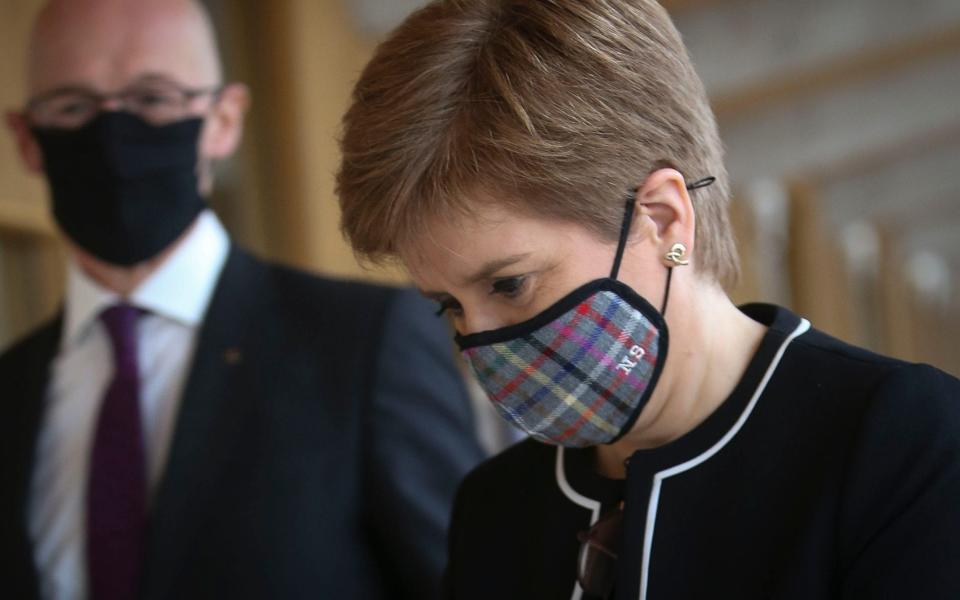Sturgeon faces backlash after saying it may have been better if Eat Out to Help Out had not happened

Nicola Sturgeon is facing a backlash from Scotland’s crisis-hit hospitality industry after she suggested a popular discount scheme credited with saving businesses and livelihoods should have never been set up.
The First Minister questioned whether the Eat Out to Help Out initiative, which saw diners across the UK receive discounts for dining in at pubs and restaurants in August, had contributed to a surge in coronavirus cases.
However, representatives of businesses north of the border said the UK Government subsidy scheme, which cost taxpayers £522m, had been a huge success and accused Scottish ministers of failing to listen to their concerns.
Stephen Montgomery, spokesman for the Scottish Hospitality Group, said much of the cost of the scheme had been offset by increased tax receipts through VAT and alcohol duty and that it was seen within the industry as a lifeline.

“If the First Minister is blaming this scheme for the spread of the disease, that’s wrong,” he said. “The spread of the disease is being caused, as [Scotland's National Clinical Director] Jason Leitch said, primarily by house parties.
“With the music ban, the 10pm curfew and the two household limit, I don’t see what more she wants us to do.”
The sector is calling for a ban on background music or sound from TVs, which does not apply elsewhere in the UK, to be scrapped and called for similar initiatives to chancellor Rishi Sunak’s scheme to be set up.
“The Eat Out to Help Out scheme gave a welcome boost to the trade at a time when it was desperately needed,” a spokesman for the Scottish Beer and Pub Association said.
“Pubs and other hospitality businesses are continuing to struggle and are crying out for further sector-specific support now. Premises in Scotland have been devastated by the ban on background music and noise from TVs, which isn’t in place anywhere else in the world."
He added: “The 10pm curfew is also hitting pubs harder due to the normal closing time of midnight or 1am in Scotland, meaning they are losing two or three hours of trade.
“The Scottish Government needs to understand the additional burdens on the trade in Scotland and look to support the industry with all the tools they have. Consumer confidence is key in this and comments which reflect negatively on the trade have a direct impact on jobs and viability of the sector.”
While she did not publicly voice concerns about Eat Out to Help Out when it was running, Ms Sturgeon continued to urge Scottish residents to think carefully before going to venues such as pubs and restaurants, while UK ministers told the public to take advantage of the scheme.

It saw diners receive a discount of 50 per cent on food and non-alcoholic drinks, up to £10 per head, on Mondays, Tuesdays and Wednesdays in August.
Speaking to ITV on Wednesday, the First Minister said that while decision-makers should not be "blind" to economic concerns, “maybe it would have been better if it hadn't happened”.
She added: "Obviously we've got university clusters just now but in recent weeks we've got two key drivers, and it's about the people coming together in people's houses, which is why in Scotland we're asking people not to visit other people's houses right now and that's really difficult, but also in hospitality settings, where people are coming together and mingling."
Her comments echo those of Devi Sridhar, a University of Edinburgh public health expert and a key coronavirus adviser to the First Minister, who has called the scheme a “short-term populist policy” that risked a spike in cases. She has suggested the money could have been spent to support businesses in other ways, without risking a rise in cases.
Since the scheme ended, lockdown-style restrictions have been reimposed across Britain, including new curbs on hospitality, with both cases and deaths on the rise.
However, Marc Crothall, Chief Executive of the Scottish Tourism Alliance, rejected the criticism, saying Eat Out to Help Out had offered a “much-needed lifeline” to businesses and had been a “significant factor” in keeping businesses and jobs across Scotland viable.
“We must remember that for the duration of the initiative, case numbers were low with most business having invested significant sums of money to create a safe environment for their guests to enjoy dining out,” he said.

 Yahoo News
Yahoo News 